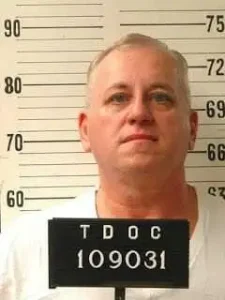Donnie Johnson was executed by the State of Tennessee for the murder of his wife
According to court documents Donnie Johnson was involved in an argument with his wife Connie Johnson that ended with Donnie shoving a thirty gallon trash bag down her throat which caused her death
Donnie Johnson would be arrested, convicted and sentenced to death
Donnie Johnson would be executed by lethal injection on May 16 2019
Donnie Johnson Photos

Donnie Johnson FAQ
When Was Donnie Johnson Executed
Donnie Johnson was executed on May 16 2019
Donnie Johnson Case
A man convicted of killing his wife decades ago at a camping center he managed in Memphis prayed and sang hymns as he was put to death Thursday in Tennessee.
Don Johnson, 68, was executed via lethal injection inside a maximum-security Nashville prison for the 1984 suffocation of his wife, Connie Johnson.
Don Johnson’s last words were a long prayer that in some places echoed the words of Jesus as he was crucified. He asked for forgiveness for those participating in the execution, saying “they know not what they do.”
He also prayed for “all those I have hurt” and thanked God for God’s blessings, including his attorneys and loved ones
After the lethal injection drugs began flowing, Johnson asked if he could sing. Given permission by the warden, he sang “They’ll Know We Are Christians” and then “Soon and Very Soon.” His voice trailed off in the middle of the second song after the words, “no more dying there.”
Shortly afterward, Johnson began making noises that some witnesses interpreted as snores and others said were more like gurgling and gasping. The noises continued for about three minutes before he made a final high-pitched vocalization and fell silent.
He was pronounced dead at 7:37 p.m.
After the execution, one of his attorneys, Kelley Henry, said she believes the noises Johnson was making were an indication that he could feel the pain of the three execution drugs. Henry said she believes Johnson would have felt like he was drowning, being buried alive and then burned. Courts have rejected challenges to Tennessee’s midazolam-based lethal injection protocols, but Henry said claims about the pain the drugs cause is unrefuted.
She also complained that heavy restraints and a partially blocked view of Johnson during a consciousness check prevented witnesses from seeing whether Johnson displayed any signs of consciousness. The restraints included what appeared to be athletic tape binding his hands, which Henry said is not part of the official execution protocol.
Johnson became the fourth person executed in Tennessee since August. The last two inmates executed in Tennessee chose the electric chair, saying they believed it offered a quicker and less painful death than the state’s default method of lethal injection. Three more executions are scheduled for later this year in Tennessee.
After the execution, Department of Correction spokeswoman Neysa Taylor read a statement from Connie Johnson’s sister, Margaret Davis
“Connie’s death was inhumane and indescribable,” she said, and Don Johnson was rightly sentenced to die. But the 34 years he spent on death row are an indication that the criminal justice system “needs to be reevaluated.”
Johnson saw three execution dates come and go as his appeals played out in court. Once they were exhausted, he petitioned the governor for clemency based on his religious conversion in prison and Christian ministry to other inmates. Letters of support included one from the president of the worldwide Seventh-day Adventist Church, to which Johnson belonged.
Connie Johnson’s daughter, Cynthia Vaughn, said she’d forgiven Johnson and joined in the request for clemency.
Gov. Bill Lee announced Tuesday that he would not intervene , following “prayerful and deliberate consideration” of Johnson’s clemency request.
Alabama administered a lethal injection Thursday evening to 41-year-old Michael Brandon Samra. He and a friend, Mark Duke, were convicted of capital murder in the deaths of Duke’s father, the father’s girlfriend and the woman’s two elementary-age daughters in 1997 after a dispute over use of a pickup truck.
Duke’s sentence was subsequently overturned because he was 16 at the time of the killings, and the Supreme Court later banned executing inmates younger than 18 at the time of their crimes. The Supreme Court on Tuesday refused to consider extending its ban on executing juvenile offenders to people as old as 20 when they committed their crimes, denying a stay to Samra . He was 19 at the time of the quadruple murder.







